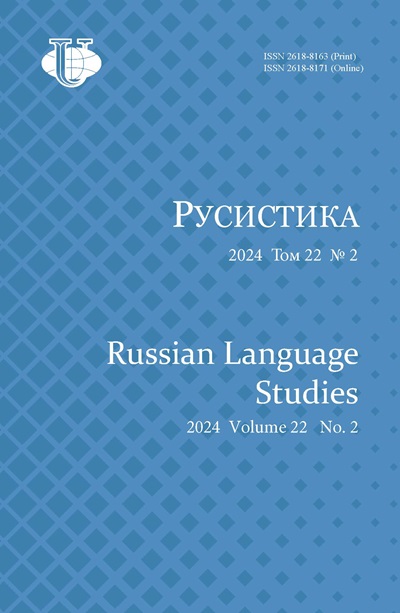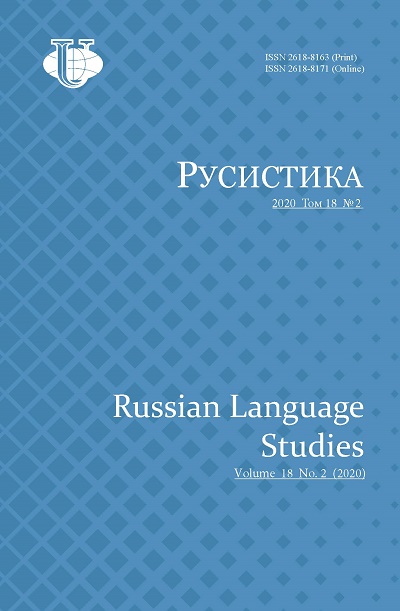Online lesson of Russian as a foreign language in the context of pedagogical activity digital transformation
- Authors: Dyakova T.A.1, Khvorova L.E.1
-
Affiliations:
- Tambov State University named after G.R. Derzhavin
- Issue: Vol 18, No 2 (2020)
- Pages: 209-219
- Section: Methods of Teaching Russian as a Native and Foreign Language
- URL: https://journals.rudn.ru/russian-language-studies/article/view/23825
- DOI: https://doi.org/10.22363/2618-8163-2020-18-2-209-219
Cite item
Full Text
Abstract
The article describes one of the organizational forms of modern digital educational process - an online lesson. The aim of the study is to disclose the concept of “online lesson” as a linguodidactic definition of modern digital educational environment, to determine its main features and methodological possibilities for its implementing in teaching Russian as a foreign language. The methodological basis of the article comprises scientific publications on electronic linguodidactics, integration of digital technologies in the methodology of teaching Russian as a foreign language, development of methodological capabilities of electronic linguodidactics in teaching Russian as a foreign language, the content and tools of online, offline and applied educational electronic resources used in online teaching Russian as a foreign language. Based on the distinction between the concepts of “distance learning” and “online learning”, the authors identify their characteristic features and outlined an “online lesson” as an independent linguodidactic definition of innovative language education, the purpose of which is to achieve a completed but partial learning goal, implemented in real time with uninterruptable access to the Internet using electronic learning tools and active forms of interaction between students and trainees. This concept has not been sufficiently and completely described in modern methodological science in the aspect of teaching foreign languages, in particular, Russian as a foreign language, which determines the novelty of the study. The practical significance of the study lies in defining modern electronic teaching aids that can be applied in online teaching of Russian as a foreign language, classifying electronic teaching aids in Russian as a foreign language based on an aspect-integrated approach, as well as analyzing the position of methodological value of platforms providing online lessons in the system of teaching Russian as a foreign language.
About the authors
Tatyana A. Dyakova
Tambov State University named after G.R. Derzhavin
Author for correspondence.
Email: Larionova86@mail.ru
Candidate of Pedagogical Sciences, Associate Professor of the Department of Russian as a Foreign Language
33 Internatsionalnaya St, Tambov, 392000, Russian FederationLudmila E. Khvorova
Tambov State University named after G.R. Derzhavin
Email: xworowa.mila@yandex.ru
Doctor of Philology, Professor, Head of the Russian Language Department
33 Internatsionalnaya St, Tambov, 392000, Russian FederationReferences
- Aladyshkin, I., Kulik, S., Michurin, A., & Anosova, N. (2017). Information Prospects for SocioCultural Development: Contradictory Grounds. The European Proceedings of Social & Behavioural Sciences, (35), 19–25.
- Azimov, E.G. (1996). Teoriya i praktika prepodavaniya russkogo yazyka kak inostrannogo s po- moshch'yu komp'yuternykh tekhnologii [Theory and practice of teaching Russian as a foreign language using computer technology] [Author’s abstr. doc. diss.] Moscow. (In Russ.)
- Azimov, E.G., & Shchukin, A.N. (2009). Novyi slovar' metodicheskikh terminov i ponyatii (teoriya i praktika obucheniya yazykam) [A new dictionary of methodological terms and concepts (theory and practice of teaching languages)]. Moscow: IKAR Publ. (In Russ.)
- Bogomolov, A.N. (2008). Nauchno-metodicheskaya razrabotka virtual'noi yazykovoi sredy distantsionnogo obucheniya inostrannomu (russkomu) yazyku [Scientific and methodological development of a virtual language environment for distance learning of a foreign (Russian) language] [Author’s abstr. doc. diss.]. Moscow. (In Russ.)
- Bol'shaya rossiyskaya entsiklopediya Publ. (2003). Pedagogicheskii entsiklopedicheskii slovar' [Pedagogical Encyclopedic Dictionary]. Moscow. (In Russ.)
- Bovtenko, M.A. (2005). Komp'yuternaya lingvodidaktika [Computer linguodidactics]: manual for university students enrolled in the direction of 520300 and specialty 021700 – “Philology”. Moscow: Flinta Publ.: Nauka Publ. (In Russ.)
- Bovtenko, M.A. (2006). Struktura i soderzhanie informatsionno-kommunikatsionnoi kompetentsii prepodavatelya russkogo yazyka kak inostrannogo [The structure and content of information and communication competence of a teacher of Russian as a foreign language] [Author’s abstr. doc. diss.]. Moscow. (In Russ.)
- Bylieva, D., Lobatyuk, V., & Rubtsova, A. (2018). Homo Virtualis: existence in Internet space. SHS Web of Conferences 44, 00–21.
- Claro, M., Salinas, A., Cabello-Hutt, T., San Martin, E., Preiss, D.D., Valenzuela, S., & Jara, I. (2018). Teaching in a Digital Environment (TIDE): Defining and measuring teachers' capacity to develop students' digital information and communication skills. Computers & Education, 121, 162–174.
- Deryabina, S., & Dyakova, T. (2018). A Foreign Language Teacher’s Professiogram in the Digital Era. Future Academy, The European Proceedings of Social & Behavioural Sciences, 18th PCSF 2018 Professional Culture of the Specialist of the Future (pp. 601–607).
- Gartsov, A.D. (2013). Electronic linguodidactics: strategies, techniques, means. Bulletin of Peoples’ Friendship University of Russia. Series: Problems of education: Languages and speciality, (1), 58–62. (In Russ.)
- Gashkova, E., Berezovskaya, I., & Shipunova, O. (2017). Models of self-identification in di- gital communication environments. The European Proceedings of Social & Behavioural Sciences, (35), 374–382.
- Herring, S. (2007). Faceted Classification Scheme for Computer-Mediated Discourse. Language@Internet, 4, article 1.
- Piotrovskaya, K.R. (1991). Sovremennaya komp'yuternaya lingvodidaktika [Modern computer linguodidactics]. Nauchno-tekhnicheskaya informatsiya. Seriya 2 [Scientific and technical information. Series 2], (4), 26–29. (In Russ.)
- Polat, E.S., Bukharkina, M.Yu., & Moiseyeva, M.V. (2004). Teoriya i praktika distantsionnogo obucheniya [Theory and practice of distance learning]. Moscow: Akademiya Publ. (In Russ.)
- Prensky, M. (2001). Digital Natives, Digital Immigrants. On the Horizon, 9 (5–6).
- Svärd, P. (2017). Enterprise Content Management, Records Management and Information Culture Amidst e-Government Development. Oxford: Chandos Publishing.
- Tryapel'nikov, A.V. (2014). Integratsiya informatsionnykh i pedagogicheskikh tekhnologii v obuchenii RKI (metodologicheskii aspekt) [Integration of information and pedagogical technologies in teaching Russian as a foreign language (methodological aspect)]. Moscow: Gosudarstvennyy institut russkogo yazyka imeni A.S. Pushkina Publ. (In Russ.)















